raceme
Showing 37–48 of 81 results
-
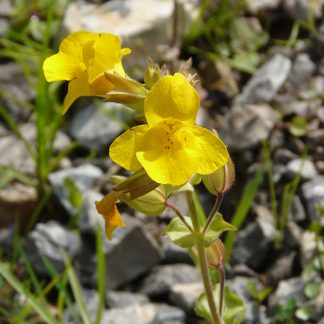
Erythranthe guttata / seep monkeyflower
- yellow flowers with red spots in clumps of 5 or more
- flowers large for the plant, but otherwise "normal" size
- two "lips" - lower lip larger than upper, each with 2 petals
- found in wetlands of all kinds
-
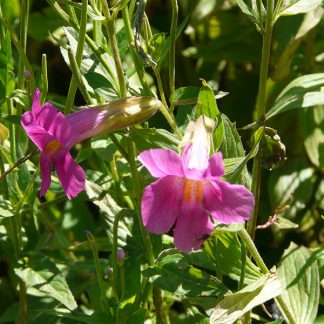
Erythranthe lewisii / Lewis’s monkeyflower
- pink to magenta with floral tube, two lips and yellow nectar guides
- usually stream-side in dense clumps
- striking
-
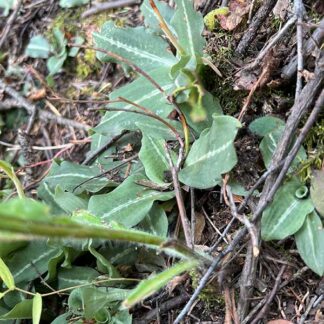
Goodyera oblongifolia / western rattlesnake plantain
- basal rosette of blue-green leaves with a white midvein
- single, leafless inflorescence stem
- greenish-white, stalkless flowers, often in a spiral
- the flowers have a hood, a short, pouch-like lip, and 2 flaring sepals
- usually found on the floor of coniferous forests
-
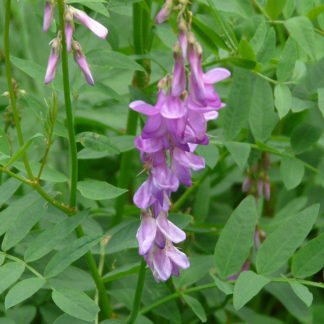
Hedysarum occidentale / western sweetvetch
- tall legume with hot pink flowers
- inflorescence several inches long; up to 80 flowers
- pinnately compound leaves with 9-21, inch-long leaflets
- higher elevations on drier, more rocky soils
-

Hesperis matronalis / dame’s rocket
- biennial, 3+ feet tall in second year
- 4-petaled flowers, especially purple or lavender
- large inflorescences with many flowers
- garden escapee
- roadsides, waste places
-

Hyocyamus niger / black henbane
- highly toxic! including contact dermatitis
- 5-lobed, funnel-shaped flowers, brownish yellow with purple veins and center; 1.5" across
- flowers in summer, e.g. warm June, July
- elliptical leaves, pointy tips, toothed or lobed margins, prominent veins
- highly disturbed areas: wastelands, field edges etc.
-

Iliamna rivularis / streambank globemallow
- showy, pink flowers, sometimes rose or nearly white
- tall, up to 6 feet
- large, broadly "heart-shaped" leaves with big, triangular lobes
-

Linaria vulgaris / yellow toadflax
- fine, threadlike leaves, plants up to 3 feet tall
- flowers similar to snapdragon, pale yellow with orange lower lip, long spur
- flowers in tight terminal clusters
- plants typically in patches
- "noxious" weed in Idaho
-
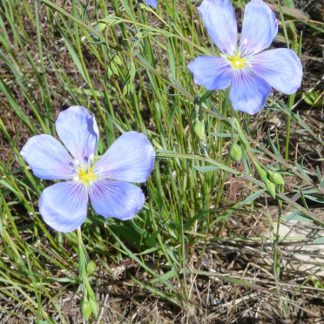
Linum lewisii / wild blue flax
- intense blue, 5-petaled flowers
- red-ish or darker blue veins in petals
- buds, flowers and developing fruit present at same time
- narrow, sessile, 1 inch (ish) leaves
- especially on roadsides and in meadows in the Valley
-

Lithophragma parviflorum / smallflower woodland star
- small, white (or mauve) flowers with 5 highly disected petals
- up to 14 flowers per stalk, usually much less
- deeply lobed, glandularly pubescent leaves at stem bases
- spring bloomer in a wide variety of habitats
-
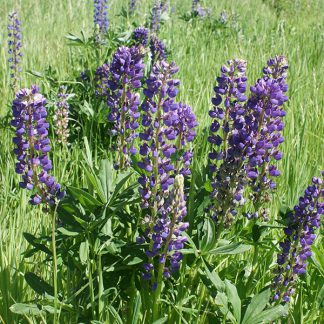
Lupinus spp. / silvery and silky lupins
- palmately compound, usually silvery-green leaves
- 5-9 leaflets per leaf; long petioles
- flowers on long, spikey racemes, blooming from bottom upward
- numerous flowers, but all rather teeny; most purple or blue
- flowers are above the leaves
- seeds in short, hairy pods
-

Madia glomerata / mountain tarweed
- stems, leaves, flowers - strongly aromatic, like tar
- sticky glandular hairs cover foliage and floral bracts
- flowers in clusters with 1 to 3 yellow ray florets
- disk florets retain visible petals; black stamens
Showing 37–48 of 81 results